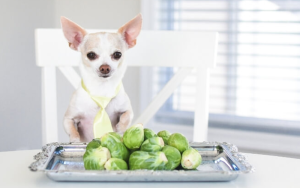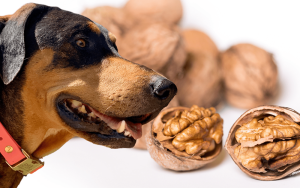Can Dogs Eat Cat Food? The Truth You Need to Know About Your Pet’s Diet

As a pet owner, it’s natural to want the best for your dog. From choosing the right toys to providing the perfect diet, we are always looking for ways to ensure our furry companions are healthy and happy. However, one common question that arises is, “Can
dogs eat cat food?” It’s a simple question that may arise when your dog sneaks a bite of your cat’s food or when you’re out of dog food and only have a can of cat food on hand. While it may seem harmless, there are important health considerations
you need to keep in mind.
In this article, we will explore whether it’s safe for dogs to eat cat food, what happens if they do, and how you can ensure your dog gets the best nutrition possible. We will also discuss the differences between cat food and dog food and provide some
tips for managing your pets’ feeding habits to avoid potential health issues.
Understanding the Differences Between Cat Food and Dog Food
Before diving into whether dogs can eat cat food, it’s important to understand the key differences between cat food and dog food. Both types of food are formulated to meet the unique nutritional needs of each species, and these needs vary significantly.
Here’s how they differ:
1. Protein Content
- Cat Food: Cats are obligate carnivores, which means they require a higher amount of animal protein to thrive. Cat food is typically richer in protein and contains a higher percentage of meat-based ingredients.
- Dog Food: Dogs, on the other hand, are omnivores. While they also require protein, they do not need it in as high a quantity as cats. Dog food typically contains a more balanced mix of proteins, carbohydrates, and fats.
2. Taurine
- Cat Food: Cats need taurine, an essential amino acid, for heart health, vision, and reproductive function. Taurine is not naturally produced in sufficient quantities by cats, so it must be included in their diet.
- Dog Food: Dogs can synthesize taurine on their own, so it’s not considered an essential part of their diet. While some dog foods may contain taurine, it’s not a primary ingredient.
3. Fat Content
- Cat Food: The fat content in cat food is typically higher than that in dog food. Cats need more fat in their diet for energy, given their more active metabolism.
- Dog Food: Dogs require a moderate amount of fat, but not as much as cats. Too much fat in a dog’s diet can lead to obesity and other health problems.
4. Vitamins and Minerals
- Cat Food: Cat food is specially formulated to include higher levels of vitamin A, vitamin D, and other essential nutrients that cats need.
- Dog Food: While dogs also need vitamins and minerals, their requirements are different from those of cats. For example, dogs can convert beta-carotene into vitamin A, unlike cats.
Is It Safe for Dogs to Eat Cat Food?
So, can dogs eat cat food? The short answer is no, dogs should not regularly eat cat food. While a small amount of cat food is unlikely to harm your dog, feeding them cat food long-term can lead to a range of health problems due to the
nutritional imbalance.
Let’s break down the reasons why this is the case:
1. Imbalanced Nutrients
Cat food is designed to meet the dietary needs of cats, not dogs. Feeding your dog cat food regularly can result in nutrient imbalances. For example, the high protein and fat content of cat food may lead to obesity, digestive issues, or pancreatitis in
dogs.
2. Excessive Protein and Fat
As mentioned earlier, cats require more protein and fat in their diet than dogs. While dogs can handle higher amounts of protein in their food, an excess of fat and protein over time can cause digestive problems. Dogs may also develop unhealthy weight
gain due to the extra calories in cat food.
3. Taurine and Other Cat-Specific Nutrients
Since dogs do not require taurine in their diet, consuming food designed for cats, which is rich in taurine, could have unintended consequences. In extreme cases, excessive taurine intake could cause health issues, but this is more of a concern if the
imbalance becomes chronic.
4. Gastrointestinal Distress
Dog digestive systems are not as equipped to handle the richness of cat food. Dogs who eat cat food may experience symptoms such as vomiting, diarrhea, and discomfort. These gastrointestinal upsets could lead to dehydration and other issues if left unchecked.
5. Risk of Obesity
Cat food’s high-fat content can easily contribute to excessive calorie intake in dogs, leading to obesity. Obesity is a serious health concern in dogs and can lead to diabetes, joint problems, and a shortened lifespan.
What Should You Do If Your Dog Eats Cat Food?
It’s quite common for dogs to snack on cat food if it’s accessible. In most cases, a small amount of cat food will not cause immediate harm. However, if your dog frequently eats cat food, it’s important to monitor their health and take some precautions:
1. Observe Your Dog for Symptoms
If your dog eats cat food, keep an eye on them for signs of gastrointestinal distress such as vomiting, diarrhea, or loss of appetite. If these symptoms persist for more than 24 hours, consult your veterinarian.
2. Limit Access to Cat Food
To prevent your dog from sneaking cat food, consider placing your cat’s food bowl in a location that is out of reach of your dog. Elevated feeding stations or closed-off areas work well for this purpose.
3. Consult Your Veterinarian
If you’re concerned about the effects of your dog eating cat food or if they seem to be experiencing health issues, it’s always best to consult with a veterinarian. They can provide guidance on how to balance your dog’s diet and ensure they receive the
proper nutrition.
How to Ensure Your Dog Gets the Right Nutrition
If you want to keep your dog healthy and well-fed, it’s crucial to provide them with a diet that meets their specific nutritional needs. Here are some tips to help you choose the best food for your dog:
1. Choose High-Quality Dog Food
Look for dog food that is formulated for your dog’s age, size, and activity level. High-quality dog food will contain appropriate amounts of protein, fats, carbohydrates, and essential vitamins and minerals.
2. Consult Your Veterinarian
Your veterinarian can help guide you in selecting the best food for your dog, taking into account any special health conditions, allergies, or dietary requirements.
3. Consider a Balanced Homemade Diet
Some pet owners choose to prepare homemade meals for their dogs. While this can be a healthy option, it’s essential to work with a veterinarian or pet nutritionist to ensure the meals are properly balanced.
4. Avoid Feeding Table Scraps or Cat Food
While it might be tempting to feed your dog leftovers or cat food, these can lead to nutritional imbalances. Stick to a consistent, balanced diet designed specifically for dogs.
5. Provide Fresh Water
Always ensure that your dog has access to fresh water at all times. Hydration is a key part of your dog’s overall health and wellbeing.
Conclusion: Should You Let Your Dog Eat Cat Food?
While it may not cause immediate harm if your dog sneaks a small amount of cat food, feeding them cat food regularly is not advisable. The nutritional differences between cat food and dog food can lead to long-term health problems, including obesity,
gastrointestinal issues, and imbalanced nutrient intake. For your dog’s overall health, stick to dog food formulated to meet their unique needs.
If your dog is eating cat food out of curiosity or because they have access to it, try to limit their exposure to it and make sure they have access to the right type of food. Always consult with your veterinarian for advice on the best diet for your dog,
and take proactive steps to ensure they stay healthy and happy.
By providing your dog with the appropriate nutrition and avoiding cat food, you can help them lead a long and healthy life, free from dietary-related health issues.
FAQs About Dogs Eating Cat Food
-
Can my dog eat cat food once in a while?
- A small amount of cat food occasionally is unlikely to harm your dog, but it’s not recommended as a regular part of their diet.
-
What happens if a dog eats a lot of cat food?
- If your dog consumes a large amount of cat food, they may experience gastrointestinal distress, weight gain, or other health issues related to excess protein and fat intake.
-
Can my dog be allergic to cat food?
- Yes, just like with any food, dogs can have allergic reactions to cat food. Symptoms may include vomiting, diarrhea, or skin irritations.
-
What should I do if my dog is obese from eating cat food?
- If your dog is overweight, consult your veterinarian for a weight loss plan. Regular exercise and a balanced diet are essential for healthy weight management.
By understanding the dietary needs of your pets and avoiding feeding them food not designed for their species, you can ensure that your dog stays healthy and happy for many years to come.






